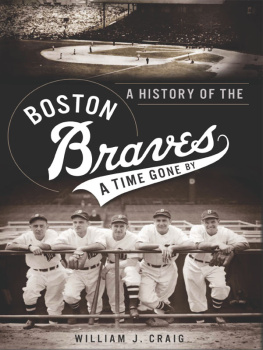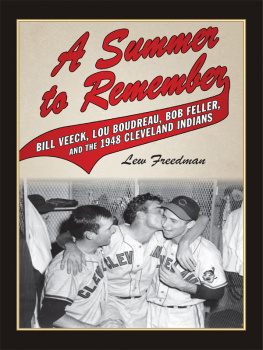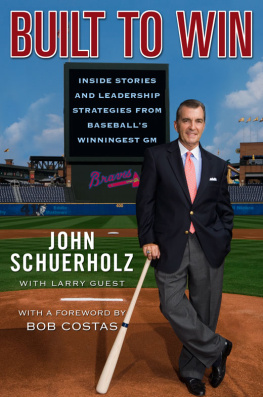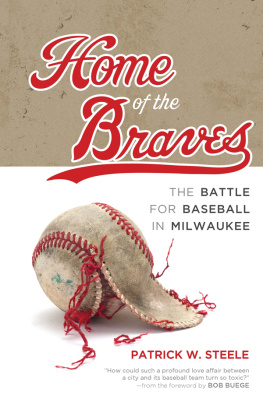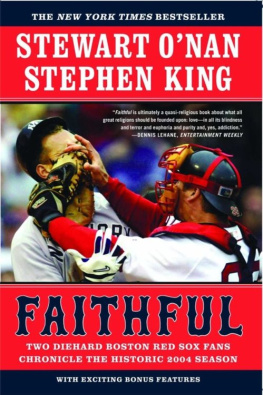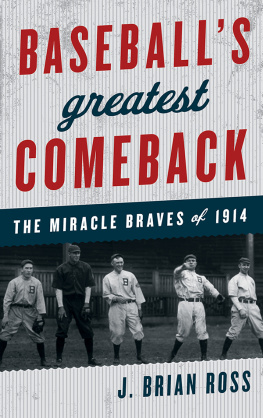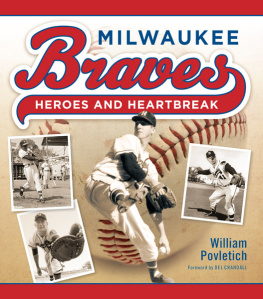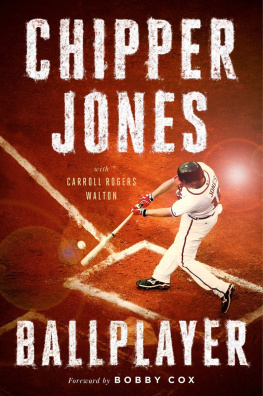
Published by The History Press
Charleston, SC 29403
www.historypress.net
Copyright 2012 by William J. Craig
All rights reserved
First published 2012
e-book edition 2012
Manufactured in the United States
ISBN 978.1.61423.769.3
Library of Congress CIP data applied for.
print ISBN 978.1.60949.857.3
Notice: The information in this book is true and complete to the best of our knowledge. It is offered without guarantee on the part of the author or The History Press. The author and The History Press disclaim all liability in connection with the use of this book.
All rights reserved. No part of this book may be reproduced or transmitted in any form whatsoever without prior written permission from the publisher except in the case of brief quotations embodied in critical articles and reviews.
This book is dedicated to my father, John Edward Craig, a lifelong Braves fan, and his all-time favorite player, Alvin Dark. My father ensured that I would also be a Braves fan and never forget that they came from Boston. For this I am eternally grateful.
CONTENTS
PREFACE
As I wrote this book, I wanted to bring to life an era that too quickly passed us by. This was the era when the idea of the game mattered even more than the idea of winning. To those lucky enough to have passed through the Braves Field turnstiles, the Braves and Braves Field will always have a hallowed niche in the corridors of their collective memory. I hope this book will help to resurrect old memories, like the faces of old friends. Braves Field was where many a child learned about the fond expectancy of springtime and the harsh reality of autumn. This was the place where fans would relax in their seats and indulge in an old dream, like their fathers before them, while watching in relative solitude their often-inept heroes cavorting on the field. Here is where spectators and players were allowed to share a common experience. There was always the feeling that you were at home; you knew the players and other spectatorsyou were a community. Even though a community doesnt always think alike, it always shares a common ground.
The Braves ball club, although constantly overflowing with defeat, couldnt help but entrance us and make us care. Across the expanse of American history, baseball, with its memories and myths, gives us standards by which we constantly measure ourselves. The underlying factor for the writing of this book is historic preservation.
Baseball is an American odyssey that links an older generation to a younger generation. It helps us pass the best of ourselves down to the next generation. Baseball fans today are caught up in a nonstop multimedia three-ring circus. After writing this book, I found myself asking, has our great American pastime, along with the Boston Braves, faded into oblivion? The answer is heard in echoes from the past. These echoes tell us that what finally does endure is a lesson that every Boston Braves fan learned at an early agesome things are more important than winning!
ACKNOWLEDGEMENTS
I would like to take this time to thank the many people who have been instrumental in getting this book completed and published: Jeff Saraceno of The History Press, the Boston Braves Historical Association for the player/fan reunions and keeping the memory of the Boston Braves alive and well, the librarians at the Boston Public Library and the staff of the photo archives for all their help, the staff of the Revere Public Library, the staff at the Baseball Hall of Fame Archives and Boston University Archives. I would also like to thank my wife, Charlene, for typing this manuscript and my beautiful daughter, Meadow Jean, for understanding that Daddy had to work rather than play with her.
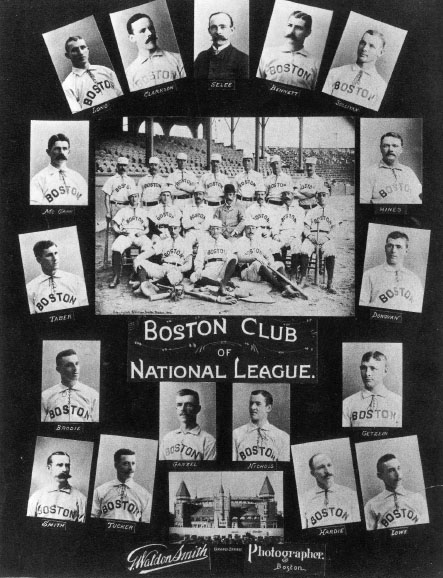
1890 Boston Beaneaters. Courtesy of National Baseball Hall of Fame (NBHOF).
INTRODUCTION
When I was born in 1972, the Boston Braves and Braves Field had been gone for almost twenty yearsall that remained was the right field pavilion and the main entrance on Gaffney Street. My father grew up a Braves fan because of his father. When I was approximately five or six years old, he would put me to bed at night with stories of the Braves glory days during the late thirties and into the early fifties.
I grew up believing that Tommy Holmes, Warren Spahn and Johnny Sain were the holy trinity of the baseball world and that Alvin Dark was the greatest shortstop who ever played the game. When we would drive by the old park, which is now Nickerson Field, I would try to picture the entire stadium still there and maybe even a game being played. From the earliest years of my life, I believed that Tommy Holmes could do no wrong, and I still do.
Braves Field has always been a mystical place to me; a shrine filled with past baseball gods and thoughts of what might have been. If you are a Braves fan, then I am sure you feel the same way I do. So sit back and follow me through this magical time warp, back to the Wig-Wam, back to when players arrived at the ballpark by trolley, back to when a seat in the bleachers only cost you sixty cents and the programs were a dime. Back to when the game was just a game and your children could look up to ballplayers as role models, long before greed and corporate corruption tainted our great American pastime.
CHAPTER 1
A MAN AND HIS PASSION
Happy is the man who can make his living out of his passion, assuming both to be legitimate. Happier still is he whose view of life is rich enough to go beyond a single pursuit to an embracing interest in human values in their broadest as well as most intimate aspects. This description fits Harry Wright. British-born Wright was the son of Sam Wright, a prominent professional cricketer in his day. Harry learned the game of cricket in Hoboken, New Jersey, at the Allesian fields. It is here that he began a love affair with the game of baseball. An unknown sportswriter once wrote, Harry Wright breathes baseball and incorporates baseball in his players. In the mid-1800s, Wright moved to Cincinnati, Ohio, and was offered a job by Aaron B. Champion, owner of the Union Cricket Club. Wright accepted the job of bowler.
In 1865, Champions interest was swayed toward baseball. He was the son of a prosperous merchant, and his talents included mercantile promotion, which he harnessed to his sports interest. In 1866, Wright switched from cricket to baseball and became the manager of Mr. Champions Red Stockings.
The Cincinnati Red Stockings certainly werent the first professional team, but they were the first to admit to paying their players. From the very beginning, Wright saw the games commercial potential. The commercialism of baseball started out with the best of intentions and wound up a cesspool filled with greed and iniquities. When Harry Wright started out to commercialize the game, he wrote, We must make the game worth witnessing, and there would be no fault found with the pricea good game is worth 50 cents, a poor one is dear at 25. He drilled his players in fundamentals and insisted they be silent and businesslike on the field. He is also credited for dressing them in knickers to increase their running speed. Once Wright felt that his players were ready for the public, he scheduled games across the country and took the team on a national tour. From 1867 to 1869 they went undefeated. In 1869, the Red Stockings finished the season with sixty-nine wins and not a single loss; and the profit that year$1.39.
Harry Wright was a great player, besides being a successful American entrepreneur who could dream as audaciously as he pleased. Not only was he the chief architect of commercialized baseball, but he also hit 7 home runs in a single game. As amazing a feat as this may seem, Harrys brother George was even more astonishing as an athlete. George also has the distinction of being the first highest-paid player in baseball. He was paid $1,400 a season$200 more than his brother Harry. In 1869, he hit .519, scored 339 runs and hit 59 home runs. An unknown sportswriter later recalled, Whenever George would pull off one of those grand, unexpected plays that were so dazzling, his prominent teeth would gleam and glisten in an array of white molars that would put our own Teddy Roosevelt and his famed dentistry in the shadow.
Next page
